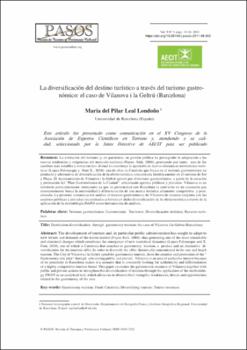La diversificación del destino turístico a través del turismo gastronómico: el caso de Vilanova i la Geltrú (Barcelona)
Date
2011Abstract
La evolución del turismo y, en particular, su gestión pública ha perseguido la adaptación a las
nuevas tendencias y exigencias del mercado turístico (Fayos- Solá, 2004), generando por tanto, uno de los
cambios más notables y estructurales el cual lo constituye la aparición de nuevas dinámicas territoriales turísticas
(Lopez Palomeque y Font X., 2010); una de ellas es Cataluña que busca en el turismo gastronómico un
producto y alternativa de diversifi cación de la oferta turística concentrada históricamente en el turismo de Sol
y Playa. El Ayuntamiento de Vilanova i la Geltrú apostó por el turismo gastronómico, a partir de la creación
y promoción del “Plan Gastronómico de la Ciudad” articulando agentes públicos y privados. Vilanova es un
territorio particularmente interesante ya que su proximidad con Barcelona la convierte en un escenario que
constantemente busca la autenticidad y diferenciación de una marca turística altamente competitiva y posicionada.
La presente comunicación analiza el recurso gastronómico de Vilanova de manera conjunta con las
acciones públicas y privadas encaminadas a fortalecer dicha diversifi cación de la oferta turística a través de la
aplicación de la metodología DAFO como herramienta de análisis. The development of tourism and, in particular public administration has sought to adapt to
new trends and demands of the tourist market (Fayos-Solá, 2004), thus generating one of the most remarkable
and structural changes which constitutes the emergence of new touristical dynamics (Lopez Palomeque and X.
Font, 2010), one of which is Catalonia that searches in gastronomy tourism, a product and an alternative diversifi
cation for the touristic offer. In order to diversify the offer, historically concentrated in the sun and beach
tourism, The City of Vilanova i la Geltrú opted for gastronomy tourism, from the creation and promotion of the “
Gastronomy city plan” thorugh articulating public and private . Vilanova is an area of particular interest because
of its proximity to Barcelona makes it a scenario that is constantly looking for authenticity and differentiation
of a highly competitive tourism brand. This paper examines the gastronomic resource of Vilanova together with
public and private actions to strengthen this diversifi cation of tourism through the application of the methodology
SWOT as an analytical tool, which allows us to observe their strengths, weaknesses, threats and opportunities
related to the gastronomy of the area.





